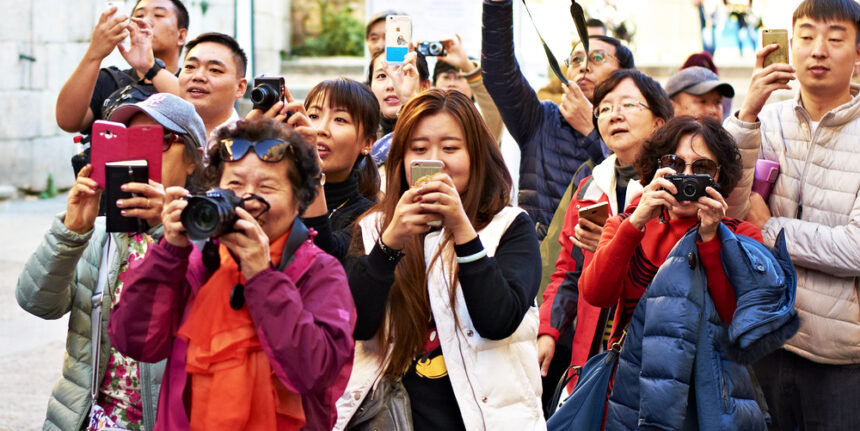
Following the easing of restrictions on China’s huge outbound travel market, Thailand’s leading hoteliers reveal their expectations for the recovery of Chinese tourism in the “Land of Smiles”. On 8th January 2023, the Chinese government announced that it would reopen the country’s borders and allow its citizens to take overseas vacations for the first time since early 2020. For many destinations, the return of the world’s largest outbound travel market – accounting for a staggering 155 million international trips in 2019 – will provide a huge boost to their economies following the challenges of the last three years.
Thailand for example, welcomed 11 million Chinese travellers in 2019, more than a quarter of its total arrivals. But what does the return of Chinese visitors mean for hotel and tourism operators in the “Land of Smiles”? Will there be an immediate influx of tourists, or will the recovery be more gradual? And what are the key factors that are likely to help or hinder the rebound?
Dirk De Cuyper, CEO of S Hotels and Resorts, the hospitality arm of Singha Estate which operates multiple resorts in Thailand, said that his company had already seen sharp rise in interest, although he expects a full Chinese resurgence to take more time.
“Our properties in Thailand are seeing steady growth in terms of inquiries and bookings, mainly from free independent travellers via online channels. We experienced a 70 percent increase in searches for our hotels following the announcement of China’s borders reopening,” De Cuyper revealed. He added however, that “a number of factors such as limited flights, airport controls, delays in passport applications etc.” are impacting the speed of the revival.
Jurairat Mongkolwongsiri, corporate vice president of sales at Centara Hotels & Resorts, which has the largest domestic portfolio of any Thai-owned hotel group, added that her company had already started to receive inquiries for FIT and group bookings in major destination such as Bangkok, Pattaya, Phuket, Koh Samui and Chiang Mai.
“The priority period is Chinese New Year and to get more requests. [But] we can only propose hotels which have availability – our Phuket properties for example, are already full. We have started to receive inquiries for inspections of our Bangkok properties and Chinese air crews are confirmed to stay at our hotel in Chiang Mai,” Jurairat commented.
Airlift is a key issue. Before 2020, Chinese travellers could choose from 28 different airlines operating on multiple routes between Thailand and China, covering 44 airports and offering 17 million seats². But these numbers dwindled during the pandemic and airlines are only just starting to re-establish services. Earlier this month, Spring Airlines said it would resume flights from Shanghai to Phuket and from Guangzhou to Chiang Mai in January, while also increasing frequencies from Shanghai to Bangkok. Juneyao Air is also resuming its service between Shanghai and Chiang Mai³.
“Thai airlines are waiting for Chinese authorities to approve additional flights, so it sounds like there may be a process to overcome before rising demand can be met. International airports in Thailand are at high capacity in terms of route and airport controls, so we expect that it will be some time until airlines can add more direct or connected flights,” De Cuyper said.
Once these logistical issues are overcome however, Thailand is likely be one of the one of the main beneficiaries of the great Chinese reopening. Dieter Ruckenbauer, general manager of Le Méridien Bangkok, which recently completed a major refurbishment, said he believes that demand from China will “steadily pick up from here”.
“We are optimistic that travel will continue to grow. According to the Tourism Authority of Thailand, in 2022 Thailand tallied roughly 11.8 million arrivals, so only about one quarter of the 2019 figure (39.8 million). Considering how much further we have to go to get back to pre-Covid levels, we do expect to experience significant updraft in the months to come,” Ruckenbauer noted.
Centara’s Jurairat agreed, but urged a coordinated approach between all the relevant parties to ensure a smooth and stable recovery.
“It’s true that the outlook for the tourism sector remains uncertain, but we are optimistic about it. It requires global cooperation and evidence-based solutions so that travel restrictions are safely lifted. With the opening of China’s borders, we can see that coordinated action across governments at all levels and the private sector is essential to help international tourism resume. We have high hopes, and we are ready to welcome the Chinese guests back to our properties,” she stated.
De Cuyper and S Hotels & Resorts are also cautiously optimistic about the prospects for 2023.
“The industry outlook is still highly volatile and there are many risks associated with inflation, rising energy costs and commodity prices which could potentially lead to economic recession in the first half of year. On a positive note however, some of our hotels have already surpassed their 2019 performance levels and the upward momentum is continuing in the first quarter of 2023. We are fully ready to welcome guests from around the world and provide warm and heartfelt Thai hospitality,” he concluded.


Comments are closed.